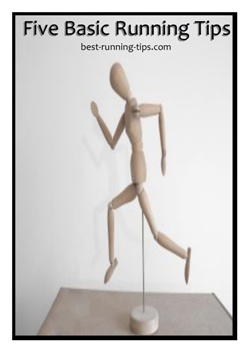Five Basic Running Tips
Get Back to Basics with These Five Universal Truths

You think you need to learn about your VO2max, the difference between tempo running, interval running and repetitions, foot types you did not even know you had, etc.
Sometimes it is good to go back to basics.
Just the simple universal truths of running, that are true for anyone. No matter whether you are a fast runner or a bit slower.
These five running tips will help your running. They will help you to stay away from injuries and consistently improve your performance.

They are:
Running Tip #1: Change Between Hard and Easy
Running hard one day after the other will soon get you exhausted and not being able to run anymore at all. Too many of us try to run as fast as possible every time they run. I can see it when answering questions from readers. We need to learn the hard/easy principle. Every hard effort needs to be followed by an easy one. On your easy days, your body "repairs" itself, literally in the case of muscle fibers, building new blood cells etc.
Run hard every day and your body will not be able to repair itself, causing it to break down eventually.
So, value your easy days as much as your hard days.
Does an easy day need to be a rest day?
No, although for beginning runners it usually is. An easy day needs to be a day in which you take your mileage and your speed down. So an easy, short run could count as an easy day.
For both beginners and more advanced runners, a lot is to be said for doing some cross training instead. It will give your running muscles and your joints and ligaments a bit of rest.
Running Tip #2: Consistency is One Key...
You will not achieve your best running if you do not run consistently. Try as much as possible to keep to a minimum number of running days per week, preferrably three or more.

When you get more competitive, you will have to run more than three times per week. However, what is more important is consistency. Inconsistency is what kills progress. Running four times one week, then not at all the next two, then pick it up again? You will not see much progress.
Try to keep to a running program that you can handle, physically and mentally. I, as I am sure you do as well, have a busy life. Demanding job, family, running, maintaining a social life, a website to maintain... it all takes time.
But there is a contract I have made with myself. No matter what, I will run at least three times a week. Each week I will block out time in my agenda for my runs and I will go out of my way to make at least those three times happen. Often I will be able to do more, but three is the minimum I do.
We all have time to take showers, brush our teeth and eat. Of course you say, that's just part of everyday life. Well, just treat your running as part of everyday life as well... :)
Running Tip #3: ... Patience is the Other

Results do not come overnight. You need to have patience with yourself. So do not expect wonders after two weeks of running training, your improvements will come but they require time.
Running training is a process. You do the work, day after day, week after week, month after month. Slowly you will get faster and fitter. But it takes time.
You also need to be patient with respect to building up the mileage; make sure you listen to your body and do not just pile up the miles. If you do that you are bound to get injured. Your body needs time to adjust to changes in workload.
Read more about increasing mileage safely here.
Running Tip #4: We're All an Experiment of One
We all have different genetics. Some of us are gifted and just very fast. Some of us will never be as fast. Some of us can handle 50-60 miles per week every week. Some of us can only handle 20 to 30.
We are all different. We can influence our fitness and our speed. Through consistent training, through slowly building up mileage and through strength training we can get fitter, faster and stronger.

We are all an experiment of one. You need to find out for yourself what works and what does not. And where your limits are. Do not get influenced too much by what other runners can or cannot do. Focus on your own experiment of one and get the best out of yourself!
Running Tip #5: Realize that Getting Better Gets Harder

First you could not run a mile.
A few weeks later you do two without stopping.
You are able to do races.
And regularly break some personal records.
However when you have been running for a longer period, your progress may stagnate for a while.
You may not run personal records anymore.
That's the point where you have reached that level of fitness at which you plateau.
After that you need to run much smarter to get better results. The key here is to recognise these moments and consider what you could do differently in your training to help yourself become even a faster runner.
This could mean that you need to increase your mileage. You may need to do more quality workouts like tempo runs or intervals. You may need to do more strides. Maybe strength training is the answer.
Once you have hit a plateau, you need to make some changes. Maybe you need to focus on shorter races for a while? Or on longer ones?
There are many different possible reasons. If you are truly stuck, sometimes it is useful to get the support of a coach. They can help you work out what your next goal should be and how to get there.
If that is something you might be interested in, check out my coaching service for further information.
I hope this article helps you focus on the important parts of your running training.
You can say an incredible lot about running. I'd say this website is a testament to that... :)
I'd never expected it to become this size!
But in the end, it comes down to the basics. Consistent running. Trusting the process of running training to deliver the results. Applying the hard/easy principle. Not getting frustrated about what other runners can do that you cannot. Stick to these enduring basic running tips and you are doing a lot right. And when you don't know how to improve any further, you can always talk to a coach like myself to work out your next steps!
Home > Running Tips > Five Basic Running Tips
What's New?
-
In the Army - Improving my 2 Mile Time
I am a 36 year old male who just joined the army. I have not run any long distance so I tried on my own to train and was doing ok but my times are still -
Marathon Diet - Improve Nutrition to do Better at the Marathon
I have got a question about my marathon diet. I have been an athlete all my life; mostly a runner, but cycle long distances sometimes. I am training -
Beginners Running Program 3 - Go from 0 to 30 Minutes of Running in 12 Weeks
The third beginners running program of Best Running Tips might be the best one. It is definitely the most popular. Get from couch to 30 minutes of solid running in only 12 weeks! -
Calories Burned Calculator - Calculate the Calories Burned While Running with This Calculator
This calories burned calculator calculates the calories burned while running, based on your weight and the distance you ran. -
Asthmatic Non-Runner With a Need to Run - 1.5 Miles in 13 Minutes
Truth be told I am NOT a runner. I can walk a 14 minute mile all day. But running, not me. I have had asthma since I was a child - severe through all -
Second Half Marathon in a Month - Should I Run It or Not?
Hi, I ran a half marathon a month ago, but have not done any great distances since, 6 miles max. I'm thinking of doing a half marathon this Sunday -
Running a 5k - Can I Be Faster at 30 Than I Was at 18?
I started running at 13 in high school. I ran cross-country, indoor and outdoor track. My track coach was very informed and my PRs were 800 - 2:22, -
Faster Minute Mile for 5K races
I'm 40 years old and I started to run consistently four months ego. My running pace went from 9 minutes miles to 7:30 minute miles in a 5k. Is it realistic -
I Need a Good Marathon Running Program
I am devastated. I ran my second marathon last weekend. I ran a marathon six months ago as well, but at about the 19-20 mile mark my legs cramped up... -
Is 20 to 30 Training Miles Enough to Run a Half Marathon
I have been a committed runner for a year and a half now and have completed two half marathons with over a dozen 10k races! I have been keeping running





